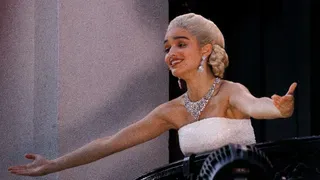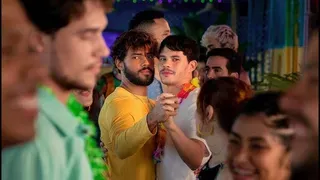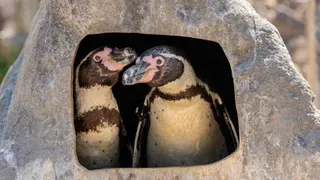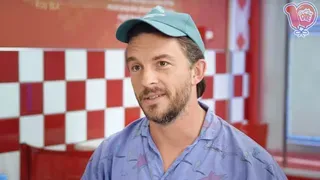September 19, 2020
Lysol and Laugh Tracks :: Ben Zook and Joe Dietl on Their Beary Funny New Sitcom 'That Darn Corona!'
Kilian Melloy READ TIME: 14 MIN.
Sick? Tired? Or maybe just worn out from the stress and anxiety of this incredibly challenging year? The creators of "Where the Bears Are" have a new confection that will cheer up your COVID blues - a web sitcom titled (what else?) "That Darn Corona!"
Ben Zook and his husband Joe Dietl have been bringing their sense of gay sensibility to Hollywood for years, coming up with LGBTQ (or LGBTQ-coded) content like the 1998 mockumentary "The Thin Pink Line" (co-written and co-directed by Dietl) and the long-running web mystery-comedy series "Where the Bears Are," as well as a mainstream fare (Zook wrote the screenplay for the 2011 Adam Sandler comedy "Jack and Jill").
Now the two - a real-life married couple who have been together for 26 years - are facing the many tribulations of 2020 the best way they know: With comedy. In fact, they're staring down the pandemic with ample one-liners and scripts that examine the challenges of COVID-19 from every infectiously relatable angle, but they're also taking things a step further and going for broke with a deliberate ransacking of the traditional sitcom genre. From broad insult humor to drawn-out reaction shots to the relentless cackle of the show's laugh track, "That Darn Corona!" feels more like a throwback to the 1970s heyday of prime-time sitcoms than a campy latter-day parody of the form.
That the show achieves both throwback and sendup status is a testament to the couple's skill and partnership. The entire production is of their own making; the show is, by necessity, a shoestring production, but it avoids feeling cheap by making itself a prime target for Zook's jokes and Dietl's consciously calibrated directorial style. The pandemic may have blockaded these bears in their cave, but that won't stop them from putting on a show and having a good time.
EDGE chatted with Ben Zook and Joe Dietl to take their temperature on their new project, their hit series "Where the Bears Are," and how they're holding up behind the camera.
EDGE: You two have been together for 26 years – have you always had this kind of creative collaboration going on?
Ben Zook: You know, it took us a while. He and I are both are writers and actors, and we started off sort of making a thing of, "Let's not work together," because you don't want to complicate a relationship with work stuff, and Hollywood is so crazy anyway. We were going out on auditions as actors, and we supported each other and were happy for each other, but we didn't make an effort to work together for quite a while, but as the years went on, we realized that this was inevitable because we have the same sense of humor, and the same actor friends and writer friends, so it worked its way into, "Of course we should try to work together."
However, we were very careful about making sure the lines were delineated: A lot of the stuff we did, like "Where the Bears Are," Joe was the director and I was one of the co-writers with Rick Copp. When you have a job delineated like that, it makes it easier. You don't get hurt feelings around, "You're not supposed to be telling me this," or whatever... Once we started working together on together projects we realized it was fun and we might as well keep doing it because it worked well.
EDGE: What sparked the idea of dealing with the COVID-19 epidemic by making a sitcom out of it?
Ben Zook: I started my own YouTube channel a year ago, and so I've been creating content on my own for a year. I'm always looking for things to do. This just sort of popped out – I was going, like, "Okay, this is so dark. We're in such a dark place. How can I let out some of my frustrations over all of this in a funny way?" Which is what I try to do with my comedy.
It's been such a hard time, too, because creating comedy is hard. You don't want to be insensitive to the horrible things that are happening to people who are losing their family and friends [to COVID-19], so it's a hard thing to try to be funny right now. But I thought, "You know what? That's what I do, that's what I try to do to get by myself; it's therapeutic." I thought, "Wouldn't it be funny to laugh at all this, rather than cry – because that's kind of our choice right now."
[Laughter]
Ben Zook: Because you can cry or you can at least try to laugh about it. I think that's where it grew out of. I thought, "What if we use a huge laugh track that's overused?" Like, "Isn't this stuff funny!" when in reality it's not funny at all, it's deadly serious and awful. But there's something about the laugh track that makes you go, "Okay, I'm gonna laugh at this."
EDGE: What's with that crazy laugh track you use in the show?
Ben Zook: When I thought of the laugh track I thought, "Okay, that's where we'll go with it: A really dark, absurdly funny sitcom about how awful all this is, with laughs!"
Joe Dietl: We're here in quarantine, so we can't really see other people and work with other people, and so Ben kind of has me as a captive participant and being an actor with him. It's not like he needed to go out and cast someone else; he couldn't work with anybody else. I was here, and he used me.
Ben Zook: Poor Joe doesn't have much of a choice. I'm like, "Guess what you're doing this week?"
[Laughter]
EDGE: You do nail the worst – and the best of the worst – of the sitcom genre with the one-liners and the laugh track, but also the reaction shots. Seeing you two in these extended shots where you're laughing on and on is funny because laughter provokes laughter in turn.
Ben Zook: That's exactly it. In fact, when we shoot it – in fact, we're actually going to shoot a new episode today – shooting is really weird because we don't have the laugh track until post-production. When we're shooting it we have to say every line and then do that mugging. So it's like, "Hey, honey, looks like you gained some more weight!" And then we have to sit there and chuckle and mug and laugh and mug and laugh. We sort of learned to do it for three beats – like, in my head I'm sort of, "One... two... three..." And then you move on to the next line. So it's really awkward when you're shooting it.
EDGE: And it's just the two of you doing the whole production. Are you switching off with the camera or have you got it set up on a tripod?
Ben Zook: We use a tripod. We have our own equipment from "Where the Bears Are," so we have an AF100 camera, which is an old camera now, but it does the job. It's a good camera. We'll put it on a tripod, and we'll usually do Joe's scenes first, and then we'll do mine, and then we'll do a two-shot. And we have an overhead boom mike that we use that's on a tripod, and we have body mics we'll sometimes use. And we have lighting, so we'll try to light ourselves; and we have powder, we don't want to sweat too much, so we put the powder on so we don't shine. We've learned to do it ourselves.
Joie Dietl: Just to be clear, we don't improv anything. Ben writes all the scripts and does all the editing – he's a one-person studio himself. But he writes the scripts, and the horrible things I say to him are all – he wrote them. I would never say the things I say to him [in the show].
Ben Zook: Yeah, like all the fat jokes, I write all the mean fat jokes about myself. Joe would never say those things to me in real life. I say, "No go ahead and say these things and it'll be funny."
EDGE: In this day and age, fat jokes are considered cringe-worthy, and that's probably a good thing, but in the time of coronavirus we're all worried about how social distancing and staying home is taking a toll on us. Weight is just one overt way we can fixate on our anxieties. But I have to say, some of the one-liners where you address those anxieties are among the best. The one where Joe says, "You put on the full COVID 19" is a classic. It's so right on the money and delivered so well, that personally, I can't possibly take offense at that.
[Laughter]
Ben Zook: That's the thing. I would normally... in fact, no, we would never make fat jokes in other material. "Where the Bears Are" is all about being heavy and being empowered by being a bear, and we would never do that. But in this, I felt the need to go, "Okay, you know what? This is all self-deprecating; everyone knows I write this stuff, I sing, and so they know, okay, that's Ben poking fun at himself." But that is the only time I would do fat jokes, at my own expense.
EDGE: So, let's talk about "Where the Bears Are" for a moment. That's a series you two co-starred in, and Ben, you co-wrote; it ran for seven seasons, and it was a mystery/comedy show that was quite popular.
Ben Zook: You know what was interesting about "Where the Bears Are," it came about because of a huge Hollywood success. I wrote a script called "Jack and Jill," which I sold to Sony with Adam Sandler attached, and he ended up making the movie. It took a while, but that was a big success for me as a screenwriter, and it allowed us financially to go, "Hey! Let's do something that we don't have to go to the studios to get a yes for." Like, let's take back the power and make something that no one can say no to. Because we had been trying for a long time in L.A. to set up projects about gay people or gay bears, and now gay is very much in, but back in the mid-2000s it was not [popular] with the studios, much less a show about hairy, overweight gay guys.
So, we were like, "Let's do this show, because we can invest in the cameras ourselves, and we can finance the first season out of our own pockets, and let's have fun with this and see what happens." And it ended up being a huge success. And that only came about because of the Adam Sandler thing. So I'm very grateful to him, actually, for doing that movie, because that allowed us to do seven seasons of "Where the Bears Are."
Now, "Where the Bears Are," we had to fundraise every season, but we had good luck with that because our fans really liked it, and we were serving an underserved audience: Bears. They were like, "Hey, we're in this show. We'll help you with fundraising." We did a Kickstarter for five seasons. We also had success selling DVDs and downloads and merchandise.
It kept us from doing other projects because we were so busy with it; we didn't have a lot of time to do other stuff the show was very time-consuming. However, it was at a time when we were like, "This is what we really want to do."
EDGE: "That Darn Corona!" is a timely response to the pandemic, but I wonder if you had been working on other, longer-form projects when the pandemic hit and those things have had to be put to the side. Is this show something you're doing while you wait COVID out, or was the pandemic the spark that inspired you to do something new and different?
Ben Zook: No, COVID, actually... as a writer, I was in a little bit of a weird place. I was sort of like, "What's next?"
Joe Dietl: We finished doing seven seasons of our show. Ben and I moved to Palm Springs, and we shot the last six seasons of the show here in Palm Springs, and then we wanted to take a break from it. We did seven years; we didn't want it to get stale; we had a great audience; we wanted to go out on top. I'm painting now, Rick is writing mystery novels, and Ben decided to do his own YouTube channel and a Patreon page so he could keep acting and writing. So he's been doing these characters for a while. A year into it, COVID hit.
Ben Zook: We do the "The Darn Corona!" show, but I do other things as well – silly characters and stuff. But also, I'm working as a producer right now on some podcast stuff, and also a TV pilot, and so it's interesting. I thought COVID would slow things down, but actually everybody's developing right now because they know once [the pandemic] is over everybody's going to need content.
Joe Dietl: Ben and Rick and I keep talking about a new "Bears"-related movie, so they're going to try to get a script done, hopefully during the tome of COVID so when it's over maybe we'll fundraise and be able to make a new movie based in the "Bears" world.
EDGE: You know, now that we have the Internet and these high-quality digital cameras that anyone can use, and YouTube and different crowdfunding options, it seems like making TV and movies has really become democratized. So many more voices now have access. If gay is in, like you were saying, I can't help thinking that a big part of that comes from exactly this: Independent productions intended to give that representation and tell those stories paved the way for the studios, which finally sat up and took notice.
Kilian Melloy serves as EDGE Media Network's Associate Arts Editor and Staff Contributor. His professional memberships include the National Lesbian & Gay Journalists Association, the Boston Online Film Critics Association, The Gay and Lesbian Entertainment Critics Association, and the Boston Theater Critics Association's Elliot Norton Awards Committee.






